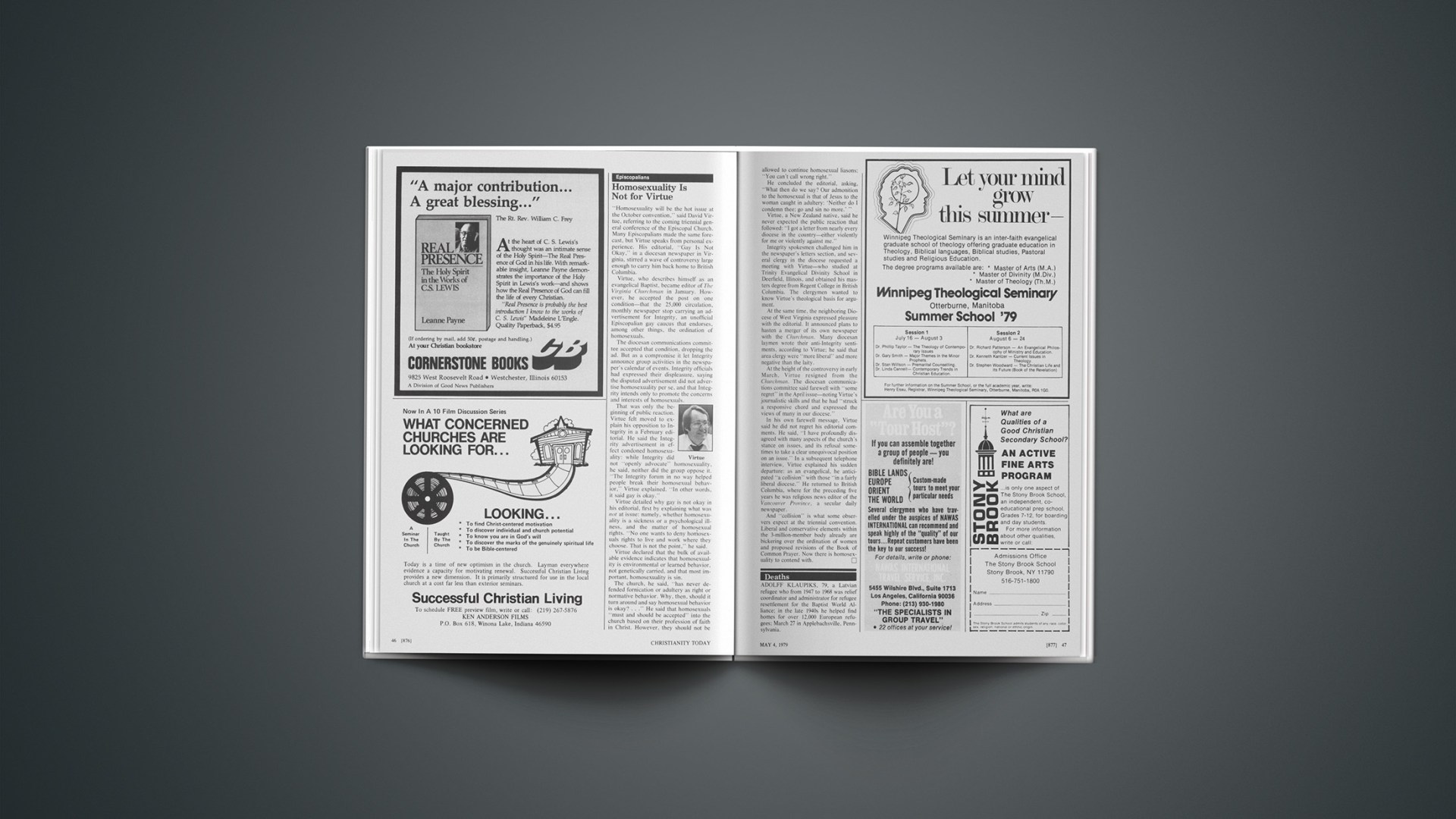ADOLFF KLAUPIKS, 79, a Latvian refugee who from 1947 to 1968 was relief coordinator and administrator for refugee resettlement for the Baptist World Alliance; in the late 1940s he helped find homes for over 12,000 European refugees; March 27 in Applebachsville, Pennsylvania.
There was no explosion or meltdown, but the nuclear accident at Three Mile Island in Pennsylvania nevertheless generated plenty of fallout that is still raining down on church circles.
A major policy statement on energy will come before the 252-member Governing Board of the National Council of Churches (NCC) this month in San Antonio. Until now, the NCC has been unable to agree on a position regarding nuclear energy. A proposed position paper was accepted only as a study document last year. Some board members felt it was too long and too opposed to nuclear technology to be accepted as policy, so a committee was instructed to draft a revision.
The revision, which is the document to be acted upon this month, takes the same basic approach as the original. It lists ethical standards for evaluating energy use, supports conservation and use of solar and other “renewable” energy sources, and opposes both nuclear power and long-term reliance on coal.
Some observers predict that the events at Three Mile Island will help the “anti-nuke” advocates in the NCC win immediate adoption of the revised draft. Under such a plan, a first-reading requirement would be waived, shutting the door to further input from the NCC’s thirty-two member denominations.
An NCC energy research team that worked on the paper released a statement of its own following the accident at Three Mile Island. The accident, it said, demonstrates the need for finding “alternative ways to meet our energy needs.” The risks, it declared, “make us again ask whether fallible human beings, who inevitably make mistakes, should be trying to use nuclear energy, where there is so little room for mistakes.”
Nuclear energy almost certainly will be a major topic for debate at denominational conventions this year. The resulting resolutions could be similar to one adopted last month by delegates to the Southeastern Minnesota District of the American Lutheran Church, the ALC’s largest conference (239,000 baptized members). The delegates called for a moratorium on construction of nuclear power plants “until the health and safety questions have been resolved.”
For one group—the Fellowship of Reconciliation, an international peace alliance of religious and ethnic groups—Three Mile Island was a sort of thunderclap of affirmation. On the day before the accident occurred, the group called for a moratorium on nuclear energy technology and research, with attention directed instead to other forms of energy, especially solar.
The accident sparked a sense of urgency among participants in peace observances that were held in a number of churches and synagogues on the weekend of April 1. The observances were coordinated by Clergy and Laity Concerned and the Religious Task Force of the Mobilization for Survival—peace groups that recently demonstrated against an arms exhibit held in Chicago (March 23 issue, p. 58). “The next step to peace is total rejection of nuclear power,” declared Pastor Arthur Brandenburgh in a sermon at Calvary United Methodist Church in Philadelphia. Members of the congregation signed an open letter to President Jimmy Carter asking him to shut down all nuclear power plants.
Antinuke ranks apparently have been swelled by an influx of church members in the aftermath of the accident. Some joined perennial protester Daniel Berrigan, a Jesuit priest, in an antinuke march on the Pentagon during the Easter weekend.
Curiously, such sharply defined sentiment against nuclear power did not appear to be shared by many of the church people who live closest to Three Mile Island. Their attitude seemed to be summed up by Southern Baptist minister Willis E. Dewberry of Camp Hill, fourteen miles upriver from Three Mile Island. Dewberry predicted that the accident would result in good: “We’ll solve the problem. We’ll make [nuclear power] as safe as anything else.” Others, however, hedged: they favored nuclear power—but only if they lived far from any reactor.
A President Rights-ly Divides the Word
President Jimmy Carter says he looks to Christ—not Paul—as the biblical basis for his support of the Equal Rights Amendment.
At a town hall meeting in tiny Elk City, Oklahoma, March 24, the audience applauded when townsman Jim Fowler asked that Carter give the scriptural basis of his support for the amendment. “I think if one reads different parts of the Bible, you can find a good argument either way,” Carter replied.
Then getting more specific, he explained: “I know that Paul felt very strongly that there ought to be a sharp distinction between men and women and women’s role ought to be minimal. But I have a feeling that Christ meant for all of us to be treated equally, and he demonstrated this in many ways.”
Carter, who later in the meeting described his routine of daily devotions, concluded, “But I really don’t think it would be possible for me to prove all the arguments for or against ERA by reference to the Bible. I look to the Bible as a source for guidance and pray for God’s guidance.”










